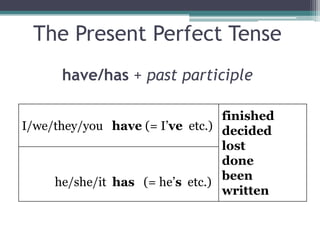
Present perfect
- 1. The Present Perfect Tensehave/has + past participle
- 2. Образование повествовательных, отрицательных и вопросительных предложений Повествовательное предложение Molly has travelled a lot this year. (Молли много ездила за границу в этом году.) Отрицательное предложение Molly has never travelled abroad before. (Молли никогда не ездила за границу раньше.) Общий вопрос Has Mollytravelled a lot this year? Yes, she has. Альтернативный вопрос Has Molly or Sabby travelled a lot this year? Molly has. Вопрос к подлежащему Why has travelled a lot this year? Molly has. Специальный вопрос How many places has Molly travelled to this year? Lots of places. Разделительный вопрос Molly hasnever travelled abroad before, has she? No, she hasn’t.
- 3. Случаи употребления Present Perfect Tense 1. Действие произошло (завершилось) до момента речи, но мы видим его результат сейчас (своим результатом действие связано с настоящим). Where is your money? – I’ve lost it. I’ve cut my finger. 2. С наречиями just(только что), already(уже), yet(еще), ever (когда-либо), never (никогда), recently (недавно), lately(последнее время), before (прежде), so far (пока). He has just phoned. I’ve already seen this film. She hasn’t found the job so far. Yet (еще) употребляется только в вопросительных и отрицательных предложениях. Have you spoken to her yet? I haven’t seen him yet. Место этих наречий, кроме lately, между have/has и основным глаголом.
- 4. Случаи употребления Present Perfect Tense 3.С обозначением времени this morning, this evening, today, in the last few days, если этот период еще не закончился. I haven’t had breakfast this morning. Если же указанный период времени уже закончился, а на это указывает место действия (где?), то тогда употребляется Past Simple. I met her in the shop today. 4. Sinceв предложении может быть предлогом, союзом, наречием: a) since– с (предлог) I have known her since 1995. b) since - с тех пор, как (союз, который вводит придаточное предложение, где должно употребляться Past Simple) They haven’t met since they finished school. c) since– с тех пор (наречие) I have never written to her since.
- 5. Случаи употребления Present Perfect Tense 5. Present Perfect употребляется со следующими выражениями: This /It’s the first time… Это впервые … This /It’s the most interesting book…Это самая интересная книга … This is the first time I’ve driven a car. Это первый раз, когда я веду машину. (я веду машину впервые.) It’s the most boring book I’ve ever read.Это самая скучная книга, которую я читала. 6. В Present Perfect вместо Present Perfect Continuous употребляются глаголы, которые не могут употребляться в группеContinuous. I’ve know her since 1999. He has loved her all his life. 7. При употреблении в разговорной речи Present Perfectиспользуется в начале разговора (репортажа). Весь последующий разговор (вопросы - ответы) передается в Past Simple. A: Have you seen him? B: Yes, I have. A: Where did you see him? B: I saw him in the street.
- 6. Present Perfect никогда не употребляются: 1. В вопросах, начинающихся с вопросительных слов when, where, how: When did you see this man? How did my friend find you? Where did they live? (Кроме вопросаWhere have you been?, если с этого вопроса начинается разговор.) 2. Когда описываются исторические события: The battle of Hastings took place in 1066. 3. Если есть точное указание, когда произошло событие: They played football a lot, when they were at school. Вместо Present Perfect во всех перечисленных случаях следует употреблять Past Simple.
- 8. Прочитайте и переведите на русский язык. Объясните употребление Present Perfect в следующих предложениях. Oliver came up to him: “Sir, I’ve written a poem.” – “Good,” said the headmaster. “May I see it?” “Where is Georg?” – “I don’t know I haven’t seen him today.” “Your hands are probably dirty. Go and wash them. ” – “I have washed them.” “Do you know the man?” – “I’ve met him.” “Where is Susan?” – “I’ve just had a massage from her.” “Well, it’s very nice to see you again. I’ve been lonely.” “Have you brought sandwiches?” – “No. I don’t know where I’ll get lunch.” “Does your little daughter miss her nurse?” – “No. She has forgotten her. ” “You know, I’m thinking of writing my memoirs,” she said, “I’ve had an adventurous life.” How many books have you read this year?
- 9. Литература Кауфман К.И., Кауфман М.Ю. Совершенствуй свой английский.Ч.2: Учеб. изд. для уч-ся 7-9 кл. – Обнинск: Титул, 2001